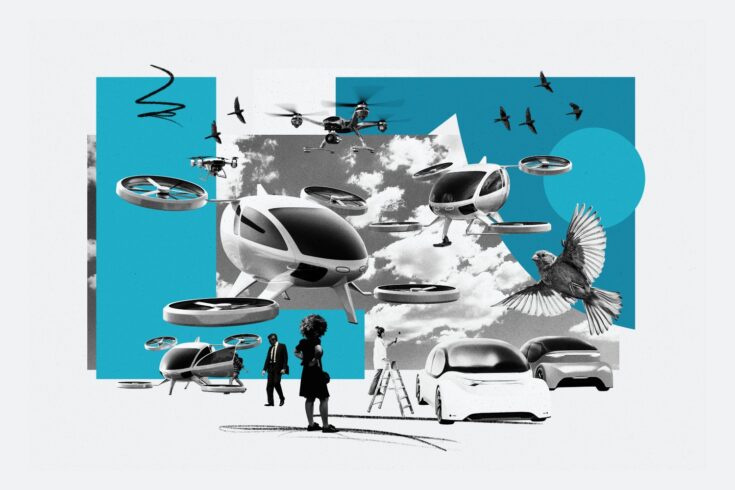Back in 2018, there was a convergence of aerospace technologies offering the potential for new types of aircraft including drones and advanced air mobility vehicles (AAM or ‘flying taxis’). We launched the future flight challenge, backed by many global companies looking to accelerate such electric aircraft and keep the UK as a global aerospace leader.
We knew that this was much bigger than just the aircraft, and it required a system-of-systems approach, but we had no idea just how far-reaching, complex and collaborative the challenge would become.
Discovery before development
Drones and AAM completely change aviation. Not only are they an early instance of zero-carbon flying but they allow for much higher volumes of flying nearer to where people live and work, and they don’t require conventional airports.
But so what?
Well, they will require a new concept of airspace management backed by a digital air traffic management system. We will need to create new concepts of airports right in the centre of towns.
To get real scale, they will be dependent on cyber-secure, autonomous systems, a huge public acceptance issue. In the same vein, we need to work with the public on valid concerns around privacy, noise and safety.
If that’s not enough, we also need new regulatory frameworks and supporting government policies from many departments.
Some of these issues were clear to us, but not all of them. We knew they interacted in a complex way and one that could not be analysed easily. We also knew that there was not an established industry with a shared view.
The best early decision we made was to not launch an early, funded innovation competition. Instead, we ran a ‘discovery’ competition with the prize of spending two days in an airport hotel.
Building a shared understanding
The demand was overwhelming. These two days created a strong community from disparate areas such as local authorities, tech start-ups, academia and global companies.
They created a shared understanding of the endeavour and built early consortia. But we also designed the shape of the challenge itself with the community.
What is UK Research and Innovation’s (UKRI) unique role here? There is a real opportunity for UKRI to act as a technically competent convener, but we need to go further. Many of the most challenging societal issues are so-called ‘wicked problems’ where there is no agreed view of the problem itself let alone what to do about it.
These require disparate bodies to work together to architect a way forward. From our experience, UKRI has the reach across research disciplines and industry and can act as a gearbox to central government to take a prime role as one of the leading architects.
New entrants shaking things up
Having worked in established aerospace for more than 25 years before joining UKRI, I have the most respect for the industry, but it is very stable and considered in its approaches.
As we have progressed through the challenge, it has become apparent that the biggest source of novel ideas and the greatest dissatisfaction with the pace of the industry has come from start-ups and new entrants to aviation.
These organisations move at the pace of tech companies (because that is what they are) in a much slower moving industry.
We learnt to find a way to reach non-established companies and to make the challenge welcoming to them. Engaging with public funding processes can be tough for smaller organisations but the bigger hurdle is to make it clear that big competitions aren’t only for big companies.
The other role for UKRI is to provide a connection for small and medium-sized enterprises to government thinking, usually the preserve of established industry with effective trade bodies.
Partnering to innovate regulations
Our challenge is driving a once-in-a-generation change to aviation. We regard it as the third revolution, the last one being the advent of the jet age in the 1950s.
As noted in this blog, the many new entrants are also driving this at pace but then learning that they are in a, rightly, highly regulated industry.
From the very start of the programme, we have worked with the UK Civil Aviation Authority as a partner and funded their innovation activities.
The concept of novel regulatory approaches to promote national innovation is very topical right now. From our experience we fully support this and would really stress the importance of developing a deep and trusting relationship with the regulator.
But there is a reality too, that changing the approach to regulation is, in itself, a transformation. More than that, it is a transformation of culture. I believe there is much more opportunity for UKRI to support the UK’s intended regulatory reform to enable innovation, growth, and transition to a sustainable economy.
Starting with ‘the why’
There were lots of ways I could have finished with big conclusions. The opportunities from bringing government and industry together, the importance of taking a mission-led approach or the power of UKRI as being greater than the sum of its parts. All are valuable.
But the standout thing for me over the last four years has been the clarity of a compelling vision to improve people’s lives. Almost every company we work with has been driven by what we can do with a green, distributed aviation system enabled by their deep tech.
Be that allowing people to stay at home for cancer treatment in remote locations, connecting poorly served rural communities or search and rescue operations. They are all social benefits affecting real people.
An early conversation with our Economic and Social Research Council colleagues led to a substantial social science work package and very early public engagement. So early in fact that we have had to create a research base almost from scratch.
Our public dialogue work, about technologies that are not yet in the public consciousness, gave us real insights, such as the desire to have trusted public bodies in the middle of decisions. This kind of social science research helps us design an ecosystem that the public will want rather than later persuading them to accept technology.
I would love to lead another mission-led programme but I would start with ‘the why’.
Top image: Credit: UKRI



